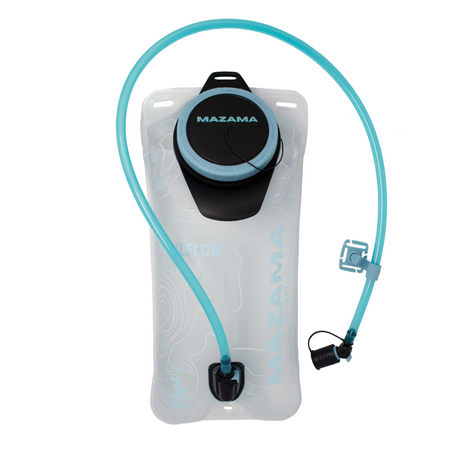Winter Hydration: How to Make Sure You’re Drinking Enough Water This Season
December 20 2021 – Matt Hoskins

When you love being outdoors, winter isn’t a time for hibernation. After fall fades into winter, we’re eagerly anticipating some of our favorite sports. Skiing — alpine and Nordic, snowboarding, snow biking, snowshoeing, and even winter camping are just a few of the activities that make winter so magical.

It’s easy to forget about staying hydrated when you’re playing outside in the cold weather and snow. But hydration isn’t unique to summer, and hypothermia isn’t the only threat in the cold. Proper hydration is just as important — and more difficult to maintain — in winter.
As Zoë Roy, Development Director at Central Oregon Avalanche Center (www.covalanche.org) says, “Staying on top of winter hydration can be easy to forget when it's often cold and wet out in the backcountry. My mouth doesn't always get as parched as it does in the heat of summer! Staying hydrated contributes to keeping your body and mind functioning well and staying warm which are all extra important when needing to make good decisions and react well in potentially harsh winter conditions.”
Here at Mazama Designs, we know the importance of easy and convenient hydration. That’s why we’re here to share the importance of staying hydrated in winter and tips to keep it simple when you’re out in the elements.
How Do We Become Dehydrated in the Winter?
It’s not hard to become dehydrated in the winter. You might not notice the need for hydration like you do in the summer. When it’s hot or humid out, you feel sweaty, warm, and thirsty — all of which make you want a cold drink of water.
But sweat evaporates more quickly in drier weather, and winter air can be dry. When it’s cold out, you lose more fluids when you breathe. Think about exhaling in the cold air and seeing your breath — that’s moisture leaving your body.
We also don’t get as hot in the winter. When we don’t feel hot, it’s harder to notice dehydration. On the other hand, winter activities in cold places require lots of layers. Sometimes, we’re sweating under all these layers without even noticing. Our bodies might also be working harder with the added weight of our bulky clothing and gear.
If that weren’t enough, we also feel less thirsty in the winter. It’s not just an aversion to ice-cold water, either. When we’re cold, blood rushes to the core to keep vital organs warm and conserve heat. Our body tricks our brain into decreasing our thirst response because it doesn’t detect a lower blood volume (which occurs when we lose fluids) in our core. We also urinate more frequently when it’s cold — a response called cold-induced diuresis — giving us a false sense of hydration.
And it’s not just the dry air outside that contributes to dehydration. Running our heaters all day dries out the air inside, too. You might even be dehydrated before heading out for your winter adventure.

Winter Dehydration Symptoms
As an outdoor enthusiast, you understand the importance of proper hydration. Dehydration occurs when you don’t take in enough fluids to replace those you’re losing. Our bodies need water to perform all of its normal functions, and when it’s low on water, we start to notice.
In the winter, some of the common signals telling us to drink water — like feeling hot and sweaty — aren’t present. Thirst is a common symptom of hydration, especially in the summer. But it’s possible to be dehydrated and not thirsty, so it’s not a signal you can rely on. Aside from thirst, there are other symptoms to look out for during the winter that should remind you to drink up:
- Dark urine
- Less sweating
- Less frequent urination
- Tiredness
- Dry skin and mouth
- Headaches
- Problems concentrating
- Dizziness
When you start to feel these symptoms, let them be a signal to stop what you’re doing and drink some water. Better yet, do what you can to prevent dehydration. It’s easier said than done, but we have some tips for helping you stay hydrated and feeling good during your wintertime activities.

Tips For Staying Hydrated in the Winter
It’s just as important to stay hydrated in the winter as it is during the summer, though we know that it’s not always easy. There are plenty of ways to make winter hydration easier, though, Here are a few of our best tips for staying hydrated in the winter:
- Plan and prepare. Check weather and mountain conditions, your equipment, and double-check what you've got packed. Calculate how long you'll be out and plan to carry enough water, plus some. Unexpected weather, injuries, or equipment breakdowns could extend your outing.
- Pre-hydrate before heading out for exercise or activities in the cold.
- Manage your layers to avoid overheating. If you start to feel too warm, take off an outer layer to help manage your temperature and to keep from saturating your inner layers in sweat. Wet clothes can be dangerous in the cold, and overheating can contribute to dehydration.
- Alternate sweet or caffeinated drinks with water. Hot chocolate can be a delicious treat on a cold winter hike, but it may not keep you fully hydrated. Make sure you drink water, too.
- Bring a hot beverage to encourage drinking. While you’ll want to balance your sugar and caffeine consumption, a hot drink can warm you up and reward your efforts, while contributing to your total fluid intake. Per Zoë Roy, “My go to backcountry beverage is hot tea in a thermos. Recently I've been adding hot broth into the rotation. Sipping on something hot and tasty keeps me much more inspired to stay hydrated!”
Your winter activities will be a whole lot more fun if you can stay hydrated. Follow these tips and consider using a hydration reservoir to make sure you’re feeling your best.
Use a Hydration Reservoir to Avoid Dehydration in the Winter
A hydration reservoir makes winter hydration a whole lot easier. When you can hydrate yourself without the hassle of stopping and fishing around for your water bottle in your pack, you’re likely to drink more water. Plus, using a hydration reservoir prevents you from having to stop for a drink in the cold — and when you stop moving, your body can quickly cool down. Here’s how to take full advantage of a hydration reservoir in the winter:
- Start with warm water in your reservoir. Having warm water flowing through your drink tube will help delay freezing.
- Take a drink every 15 minutes — which is easy when you’re using a reservoir. Drinking often keeps the water moving through your drink tube, preventing it from freezing.
- Blow the water back out of your drink tube and into the reservoir after you take a drink. Emptying the drink tube means your water won’t freeze inside it.
- Tuck your drink tube and valve under your jacket. Keeping it close to your core will prevent freezing.
- If your tube is exposed and does freeze up, remove it and tuck it inside your jacket to try and thaw it.
- If just the valve is frozen, you can remove it temporarily and drink directly from the tube.
- If you’re still having trouble with water freezing in your drink tube, use an Insulated Drink Tube Kit. You can add it to your existing system to make a winter-friendly drink tube.
- If your water’s getting too cold for you to want to drink it, an insulated reservoir can keep warm water from becoming cold.
- If you're camping overnight in frigid temps, put your reservoir in a warm spot (for example, next to you in your sleeping bag) to prevent freezing.
Having a convenient hydration system that doesn’t freeze up makes all the difference in winter hydration. Above all, make sure you have a system that makes hydration as easy as possible.

Stay Hydrated All Winter Long
Stay safe and hydrated while you’re recreating this winter. Whether you’re hitting the slopes, snowshoeing your favorite trail, camping out overnight, or simply walking the dog, don’t let dehydration get you down. Find the perfect hydration system for your lifestyle and favorite activities at Mazamadesigns.com.

